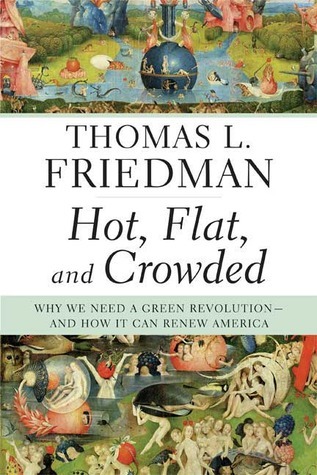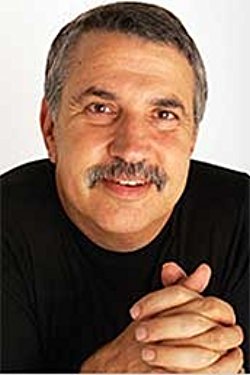Hot, Flat, and Crowded Summary

4 min read ⌚
 Why the World Needs a Green Revolution – and How We Can Renew Our Global Future
Why the World Needs a Green Revolution – and How We Can Renew Our Global Future
The population nowadays is seven times bigger than it was in 1800. To be more precise, the global human population increases by 75 million annually. Demographers estimate that the total population will probably be nine million by the middle of the twenty-first century.
Who Should Read “Hot Flat and Crowded”? And Why?
Judging by the many interviews and discussions referenced in the book, he has done a great deal to gather proof that supports his opinion. In short, his message is that prevailing worries and explanations about global warming are valid.
Because of irresponsible utilization, the world faces an environmental calamity of unparalleled extent. Readers familiar with the news, a lot of what Friedman says, will be to some degree recognizable.
However, he has a strikingly engaging method for presenting it, so we recommend “Hot, Flat, and Crowded” to everybody who wants to comprehend the present issues of the world we live in.
About Thomas L. Friedman
 Thomas L. Friedman works for The New York Times as a foreign affairs columnist, a job that has brought him the Pulitzer Prize three times. He has also won the National Book Award and is a two-time winner of the Overseas Press Club Award.
Thomas L. Friedman works for The New York Times as a foreign affairs columnist, a job that has brought him the Pulitzer Prize three times. He has also won the National Book Award and is a two-time winner of the Overseas Press Club Award.
His book Hot, Flat, and Crowded is an international bestseller. He has also authored From Beirut to Jerusalem, Longitudes and Attitudes, The Lexus and the Olive Tree, and The World is Flat.
“Hot, Flat, and Crowded Summary”
Most of this growth will happen in precarious countries. A considerable number of individuals in these developing populations are attracted to the “American Dream” life marked by consumerism and convenience. Indeed, the American way of life is quite appealing.
However, it is unsustainable and unattainable for everyone, since the world does not have that many resources to satisfy the growing consumption.
The world is crawling into the energy-climate era. The global demand is growing, and the supply of available resources has never been this low. Easy oil money fuels dictatorial regimes in countries that have oil; these countries do not need to empower their citizens.
There is no need to educate people, stimulate innovation and entrepreneurship (at the risk of average citizens asking to have a say in the country’s affairs) when your country is rich in any case.
The climate change, which sneaked up on nations while they occupied themselves with other things, asks for intensive ideas, infrastructures, and activities. If society does not address the difficulties of global warming and ecological degradation, accomplishing different objectives, whatever they might be, will be unimaginable.
Furthermore, the world suffers from energy poverty. Over one-fifth of the population is not connected to electricity. Not having power, millions of people cook over smoky indoor fires – most of them pass on from respiratory maladies. Countries must save their natural resources.
Odd things have been occurring because of the unstable climate. Warm days come in midwinter; blossoms sprout in January, dry seasons are constraining populations to pray to God for rain. Numerous species are becoming extinct before scientists can even realize what they are and what they do.
Additionally, melting tundra may release vast amounts of carbon, intensifying the greenhouse effect. Biodiversity and the biosphere’s balance, which is pivotal to human life, is in real danger.
Turning around such trends requires from both the public and governments to take responsibility. People must perceive the individual financial value of environmental care; this implies that states must extend the present endeavors to ensure that preservation is in their citizens’ financial interest.
Take China, for example. Under ecological coercion, China is going green. In reality, China may have no other alternative to practicing environmental safety. People are stifling on Beijing’s air. Pollution is harming the country’s lessening water supply.
Also, green innovation exports are making Chinese business people rich. It is time for the whole world to join the change.
Key Lessons from “Hot, Flat and Crowded”
1. Energy Opportunities
2. The Role of Economic Policy
3. The Role of IT
Energy Opportunities
Although green living has turned out to be in vogue in America, Europe, and Israel, support exists mostly for straightforward measures. Substantive change is never widely trendy.
Hence, practicing environmental awareness comes with a price: it requires firm political decisions. It is excessively disputable and draws an excessive number of adversaries. At the same time, energy issues are energy opportunities.
By creating instruments and solutions for the global warming, America can position itself as a financial authority in the energy-climate time.
The Role of Economic Policy
The Economic policy could help tackle the issues of a hot, flat and crowded world, as well. It can do so by sending the correct value signals and giving financial incentives for environmentally friendly behavior. If “green” is less expensive, better and faster, people will purchase “green.”
Making this happen does not require as much as it sounds it does; it just needs some financial motivators that will push business people to want to go green.
The Role of IT
Information technology can help in the building of an “Energy Internet.” At the moment, some people are already trying out prototypes.
Studies show that just by utilizing more energyefficient appliances, fluorescent lights and isolating their homes, U.S. families could cut the nation’s power utilization by a third.
Like this summary? We’d Like to invite you to download our free 12 min app, for more amazing summaries and audiobooks.
“Hot, Flat, and Crowded” Quotes
Yet they throw money out the window...on the old, established, well-capitalized oil, coal and gas industries. Share on X A strategy that depends on outmining, outdrilling, outconsuming, out exploiting your own resources or a global commons…is not going to offer a sustainable competitive advantage any longer. Share on X To have an impact on the environment…learn the rules around energy efficiency and emissions, and how they get made. Share on X We have been living for far too long on borrowed time and borrowed dimes. Share on X Later is over. Share on XOur Critical Review
This passionate book hits all the familiar subjects and stories and raises an ardent ecological alert.
The author Thomas L. Friedman is a talented creator of fresh expressions, and he writes and “talks” to the readers splendidly.








